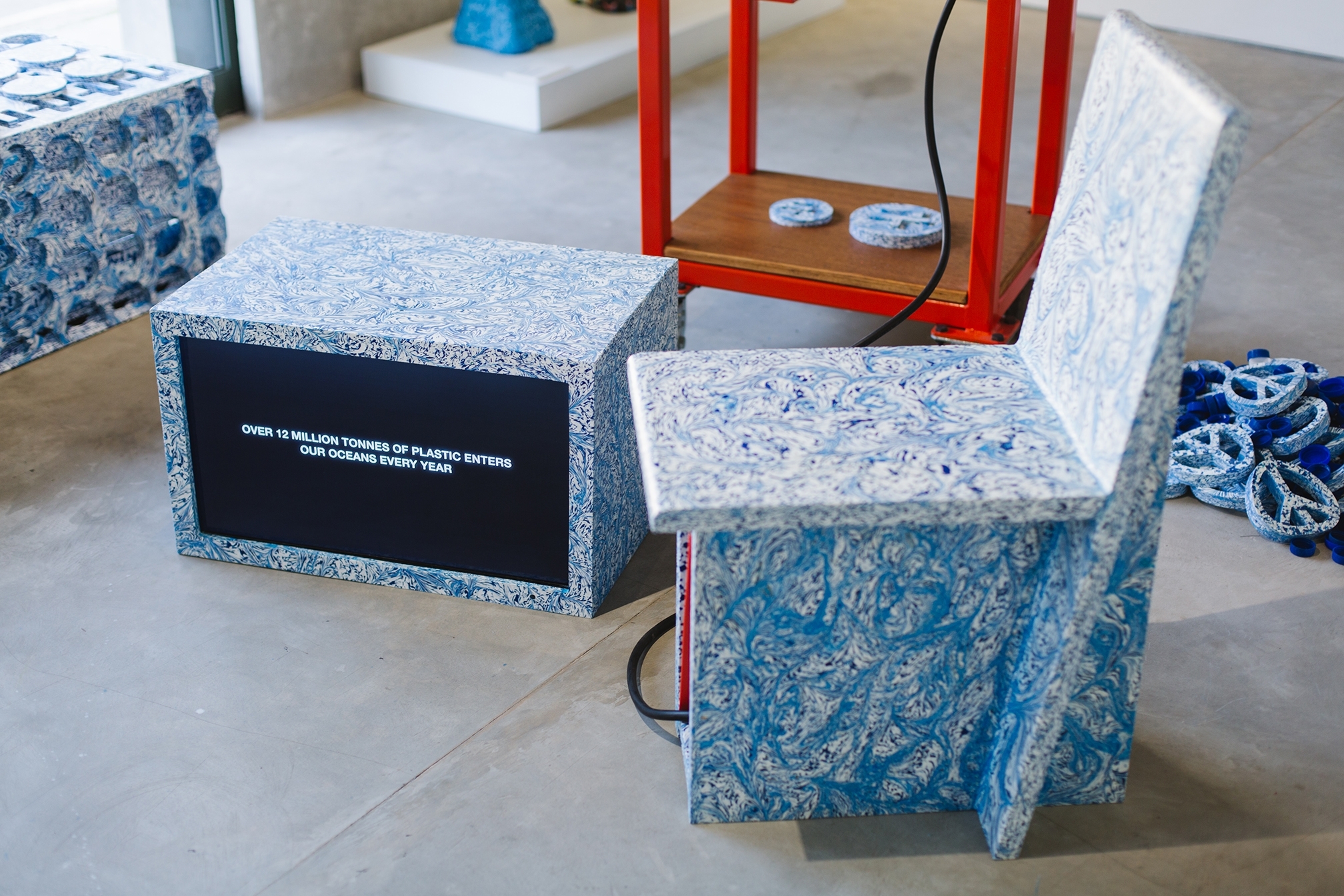 Green Room
Green Room
Dan Mitchell is making Space Available in the music industry for recycled plastic
Solutions to build a better future for the music industry...from Bali
At the Museum of Space Available (MoSA) in Bali, Dan Mitchel imagines a new path for the music industry by reimagining the possibilities of plastic waste.
Initially launched as a creative platform during the pandemic, Space Available—a name inspired by all the empty billboards in Bali advertising space available at the time—is now a studio and museum focused on sustainability and circularity in Canggu. On the surface, Dan takes waste and transforms it into things like shirts, turntable cases and functional furniture for the music industry and beyond. But dig a little deeper, and you'll discover that he's actually tackling the global waste crisis by finding his niche and creating experiences within it. Through these experiences, he wants to facilitate education and create dialogue around the issue of plastic waste—but that can be hard to engage, so he presents his findings as artisan apparel, music accessories, high-end homeware and other alternative products created in harmony with nature. At the time of writing, Space Available has upcycled three million plastic bottles into their products and architectural projects and has a sharp strategy to expand globally...but sustainably.
Obviously, he doesn't do all of this alone. He leans on artists, designers, bioscientists and environmentalists on his limited edition ranges, Space Talks series and case studies, the latest being an exploration of mycelium called Radical Fungi that embraces its potential as an ecological material for the future. But perhaps most importantly, is that Dan looks inwards for those to collaborate with, and his projects bolster young talent and renew local craftsmanship in Bali. And then there are the DJs…
Though he's not targeting the music industry specifically, from a young age, Dan has remained firmly rooted in music, so much of what he does appeals to music fans. Having collaborators like Peggy Gou helps, and together they launched the Peggy Chair in 2021, which became Space Available's debut drop. Each chair removes 20kgs of plastic trash from oceans, rivers and landfills in Indonesia, and contains vinyl storage in its base.
We wanted to know more about how exactly he turns a plastic bottle from a river into a record bag for your vinyl, his plans for expansion that doesn't mean shipping trash around the world, and how he thinks the music industry can do better. See the world through Dan Mitchell's green-colored lens, one where innovation is soundtracked by great music.
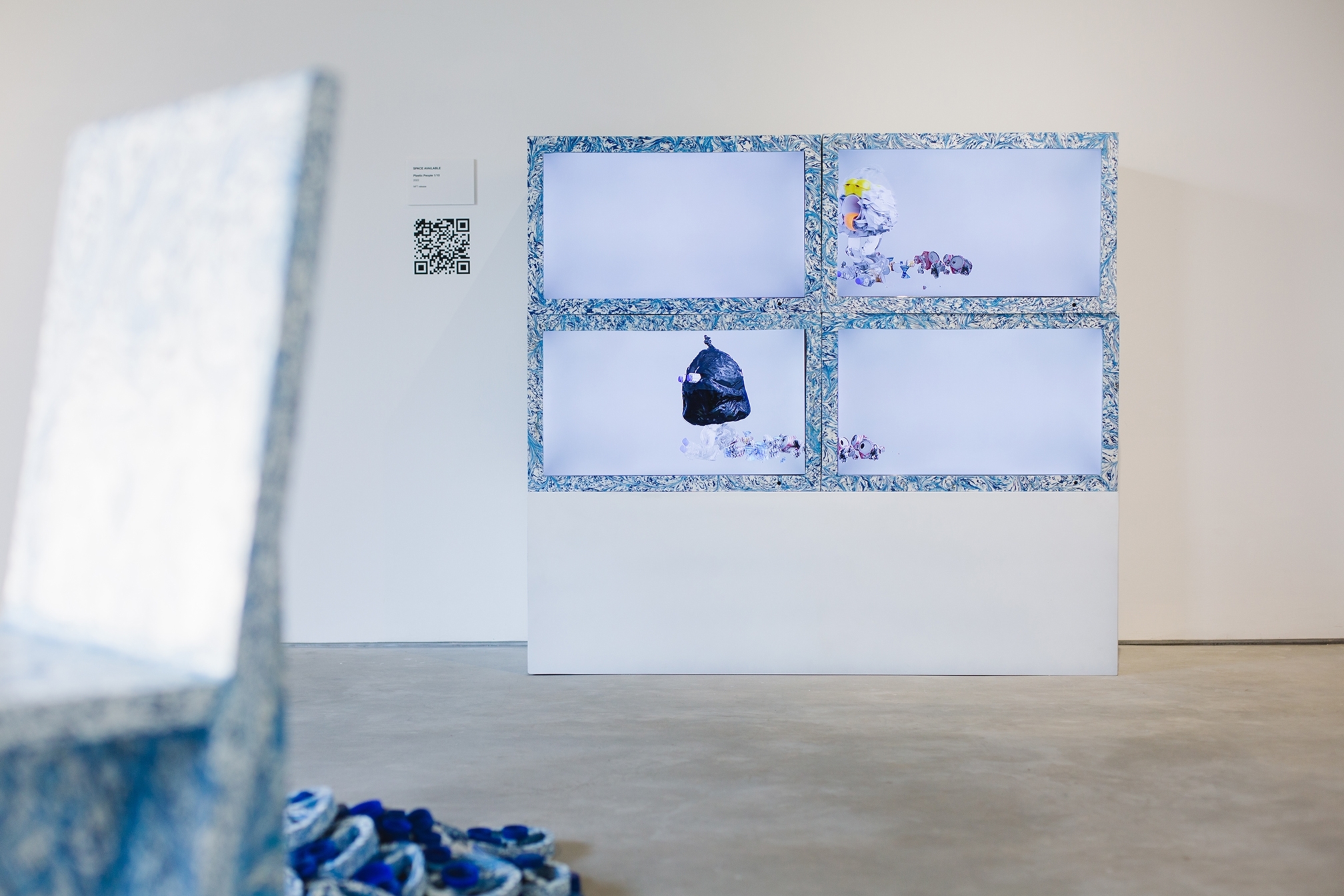
So obviously, we know you well from your time at Potato Head. But even before and after that, you’ve always been rooted in music. Could you talk me through your relationship with music? Where it started, and where has it gone?
Music has always been a big part of my life. Growing up as a skater, it was at the very core of the culture that I realised music ran through everything and influenced so much culture. Music was also my gateway into fashion, art and design and shaped me from a young age. All my life, my wider community and friends have always been involved with music in some way.
In 2010, I co-founded LN-CC, a core fashion store, but we also had a record label, a listening room in the back, and a record store within the space. When I left LN-CC, I set up Island Of The Gods Records here in Bali, and since joining Potato Head, I booked probably 500+ acts across festivals, parties and happenings.
During the pandemic, I took a back seat at Potato Head and set up Space Available, a research-led initiative making space for nature. We set out to tackle the waste crises using design, art and music as the vehicle for change. On the product side of Space Available, we make turntables, record boxes, DJ booths and music-related goods from waste plastic. We are also making music accessories from mycelium (mushroom), which is a biomaterial of the future.
I believe the vibrational force of music ties us all together, and it is the universal language that will connect us all on this Earth and beyond.
"I believe the vibrational force of music ties us all together, and it is the universal language that will connect us all on this Earth and beyond."
How long had you been tinkering with this idea of Space Available?
Many people have asked me how we did this all within a year—and within the testing times of the pandemic—but I've been doing this kind of work for a long time. I've been a Creative Director for 15 years, so it was very much a natural progression for me to create the Space Available platform.
Space Available is very much driven by a purpose to build a better future within a cultural landscape, this moment of disruption felt like a good time to start after what our planet has just been through, and people are thinking differently about how the future could look and how we can develop new, smarter systems.
Looking towards the future, we're working to become a cultural institution-like organisation that nurtures music, art, design and food while having a purpose behind why we're doing it. From an environmental perspective, we’re conscius about showing people an alternative to the current linear model of ‘take, make waste’ — but doing it a more culturally led experience. We started the platform with education in mind, with the workshops and podcasts and whilst we have been developing products and experiences 2023 will be very much rooted in education for us.
What’s the relationship between Space Available and Potato Head?
I've been the Creative Director at Potato Head since 2014 and the ethos of working to better ourselves and the planet gives me a lot of fulfillment and meaning in my work. With Space Available, I’m building upon what I was doing at Potato Head but with Space Available, it has a more scientific approach in the way we research case studies and craft our products. That is why we built a museum and lab to showcase our research and works.
But the concept predates my role at Potato Head because music was the beginning of where it all started for me when I was 16 years old, and music is still at the heart of what we’re doing at Space Available. There’s always an element of music in everything we do, whether it’s what we’re listening to at home while writing, making items for our store around old vinyl, or collaborating with friends who are musicians. I've always been drawn to music people more than anything and I think people who are working within music or enjoy music will enjoy what we’re doing.
Let’s look at an audience who only comes to Bali for the music and the parties. How would you describe the Space Available concept and get them on board with your reason to believe?
In short, we are a creative platform and radical design studio trying to build a circular future. We're doing that by being culturally relevant within the music space and the cultural landscape as a whole. We’re trying to do a little bit better in the world in a way that nods to music and the old ways of vinyl culture but looks to the future in the way of circularity. But that’s a very contentious subject because of the way that culture has generated waste and plastic. In its defense, it’s not single-use, you know? I’m not anti-plastic, which a lot of people think I am. I think plastic is a great material that has its place, but when it's single-use, that's the issue because there's no system for it to work within—that’s the main problem. if everything were taken care of properly within a circular system and recycled, we wouldn’t have a need for new plastic again. There’s enough plastic in this world now to continue using it beyond our lifetime, so humans need to think about how and where we can use it differently.
How do you see the relationship between music and the planet?
Music itself is sustainable and natural; it’s just particles of air. It only exists once you record it. We could start singing now, and all we're doing is creating a vibrational force that aligns with what’s happening in the universe.
But concerning the business side and the impact of festivals, tours and touring DJs, there’s a big problem with that side. Sometimes you get like 50 people on the road, and it’s a lot of flights and then festivals create enormous amounts of waste! But it’s getting better, and we’re getting approached by many festivals that are trying to do things better.
But I think everyone’s starting to wake up now and there are very smart people out there trying to find solutions, and I'm pretty hopeful that we will—and hopefully, they'll make a it economical because, ultimately, you have to make sustainability and regenerative culture work financially to make change because that's the system that we're in.
People want to live a life where they can still look after themselves, their family, and their business but still do things better for the environment. I think we’re still a long way from that, but some very interesting technologies and materials are coming into play now. And as soon as people see the value in waste, which is what we're trying to do, then they’ll not want to throw anything away. I'm pretty positive about the future.
The world is talking about the climate crisis. Do you think the music industry has to be talking about it?
I think everyone should be. We all have a responsibility as human beings to care about the planet regardless of which industry we're in. Just look at the data! Although some people don’t want to believe it and there are obviously climate deniers, which I think is pretty absurd. Although, there is an argument for how bad it will be in the future because we don’t really know. Is it as big of a problem as the poverty crisis? It’s very much interconnected and I think people like Bjorn Longborg have really good data-driven solutions we can look at implementing. But many people don’t seem to want to have a conversation about it; they’d rather just shout at each other, which creates further division.
But talking about it keeps that dialogue going, and that’s what’s happening in most industries right now. Brands are talking about the climate crisis, and that’s a step in the right direction. Sustainability will only get better and more easily implemented from here.
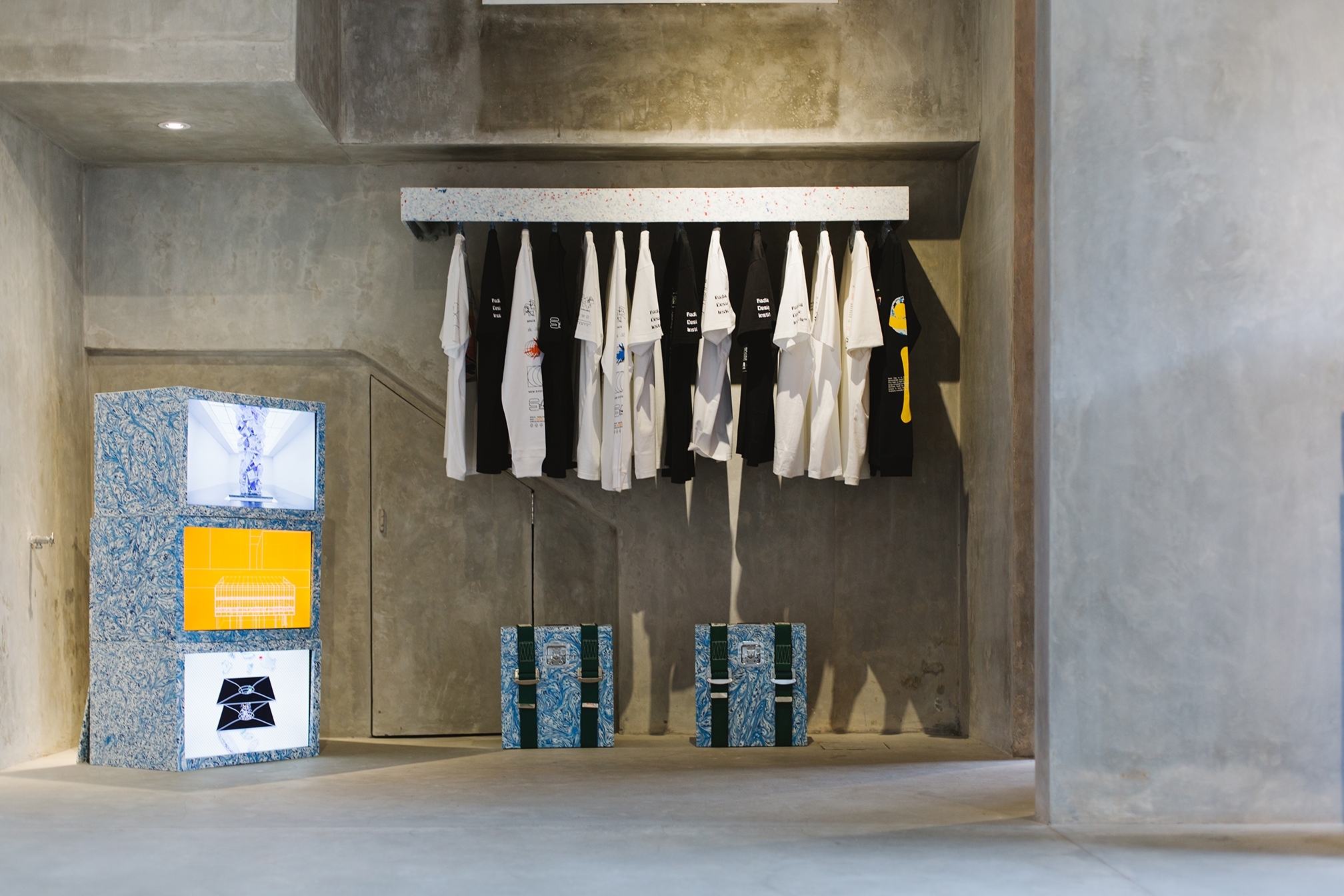
Art has been a great catalyst for sustainability. Do you think that music can be the same?
Sure, we just have to think about what people are consuming within the music industry and ask ourselves how we can do things better. Exploring circularity within the music space is something we are definitely seeing.
We should also ask ourselves how we can make a low-impact product and how we can make experiences better. Music festivals are an important place that brings people together while acting as a platform to showcase innovation. Music is the one thing that unifies everybody since it’s probably one of the most popular elements of culture and touches so many people. We should be using these moments at a music festival or an event to showcase companies and brands that are in the industry and creating change. Let them literally showcase the possibilities and let music fans get inspired by it. We already know that music is what gets them in the door, but they also want other experiences while they’re there. It’s the perfect opportunity to really bring people together to try and change their mindset.
You’ve taken plastic waste and turned it into items for the music industry. Is it easy? Do you think it has the potential for mass production and to become an actual solution?
It's not that easy because we are dealing with waste, and by the very nature of that, the material can be very inconsistent. But with persistence, it can be done. What we're doing now with Space Available is pretty niche. Everything is made by hand. Although there is the ability to scale and we hope to see many brands doing this as standard practice in the future. There are a lot of other solutions out there, and I don't think there is one solution that fits all but better ways of doing things are out there.
We also take an educational approach to change how people think about things they throw away. For example, we're making music equipment out of recycled CDs, showing you the kind of circulatory system we can look into within the music industry. It's also a good way of looking at the graveyards of previous formats within the music industry that were mass-produced and how to create new things out of them. Many things that go to landfills have creative solutions. Same with vinyl records, people are making vinyl out of recycled plastic. And the more we experiment with these types of solutions, increasing the production volume is the natural next step in any economy.
You often use the word “circular” to describe Space Available and your many projects. In what areas do you feel the music industry could be more circular?
It's looking at the whole system. The job doesn't end when you sell your product. You need to look at what happens after you've sold your product and consider the repair strategy for five to fifty years down the line. Is it easily recycled? How can you track that product? How can you build a better relationship with your customers so they know they are supported and can always come back? Longevity is so important! This all yields better retention for a company as well, because you build a relationship with the customer versus them just consuming and hoping you'll get them with the next product, next time—which is kind of like what Apple will do just with constant upgrades, rather than saying, well, actually this iPhone will last you a lifetime.
I’d like to break down the process of the items you create. Let’s start with the chair and the collaboration with Peggy You? Can you walk me through how this piece was created?
Peggy Gou, a good friend of mine, has always shown a lot of interest in plastic recycling. Every time she was in Bali, she felt drawn to what we were doing and wanted to use her platform to make a difference.
We put this idea forward to her about doing a chair and sent her a rough sketch, which initially didn't have any record component. She then made her own sketch and sent it back to me, having added the record storage at the bottom and crafted a unique design using our recycled plastic.
What was the production process like?
We worked with recycling collectors in Surabaya to gather as much waste as possible and began developing the chair from there. In the end, we collected 20kg of plastic waste to produce one chair. We gather the waste, wash it, and then shred it in a machine before getting put into a pallet. Then we put the pallets in a big mold, which goes into the oven and comes out in big sheets. And from those sheets, we cut them down and made the chair.
And what's unique about this chair is that it's truly zero waste. And not only because it's made from recycled waste, but we also turned the offcuts from the chair into welding rods to weld the chair together. So we didn't use any glue or any nails and literally created a zero-waste chair.
But coming back to circularity, because there is only one material, should the chair break in the future, we could make another one right away because it's not like we have to find out where all the nails are. It's more difficult to recycle something when it's made with difficult materials. We always try to create with minimal intervention and without any adhesives to ensure that whatever we build can be easily recycled back into the system again.
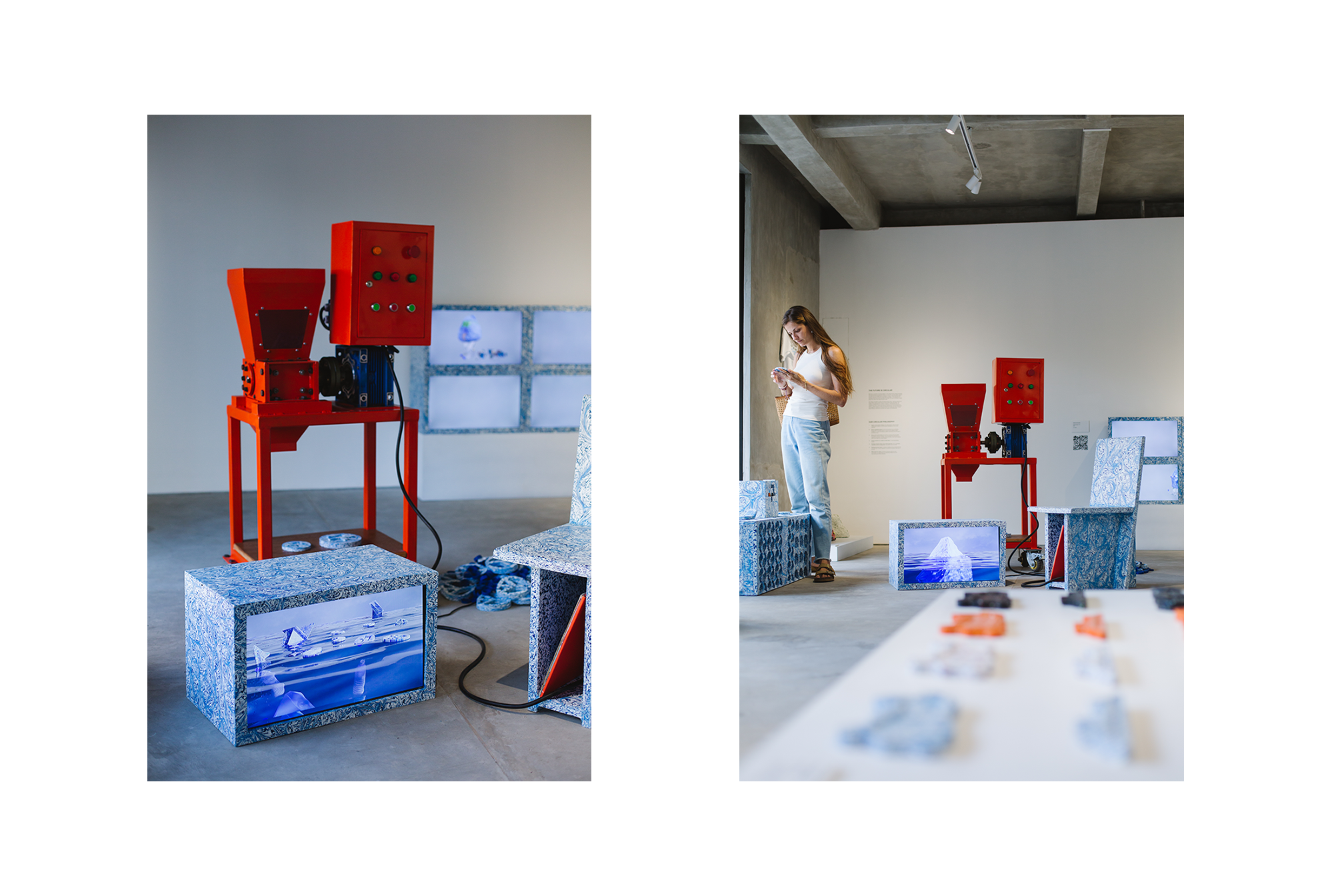
You mentioned that you’re collecting trash from Indonesia but also starting to manufacture in other countries. How do you offset your emissions from shipping?
This is a great question.
Initially, we started as a creative studio. We put a collection together and expected one or two stores to buy it. Our sales manager even told us to manage our expectations, citing how hard it is to get into stores, especially during the pandemic. We hadn't even developed any samples and just sent out photographs at the time. Lo and behold, everyone loved the ideas, and we got a lot of orders from some of the top stores around the world. We got to work and built a production facility, which was so exciting but while we were doing it, we realized the problem—these stores were literally around the world and the emissions from shipping were a problem for us. We would essentially be shipping trash around the world!
So we are embarked on a journey to become a global brand with hyper-local production. This means implementing a model where if we're selling in the UK, everything is made in the UK. It's trash collected from the UK, jobs created in the UK, manufacturing made in the UK, and so on. But we're a small brand and we can't do that overnight; it's going to take a bit of time. We plan to fully implement this in the UK within a year, and then we're planning for Japan as we gradually spread out and become a locally driven brand with a real global vision.
That's the idea anyway because we definitely don't want to be shipping trash around the world. But even now, the benefits do outweigh this because we're starting a conversation with buyers and customers around the world, which creates an impact. People are inspired, and that's a great start. I mean, you're never going to be perfect, it's more about progress and perfection, and that's where we're heading.
So even though you’re a brand built around sustainability, you're not 100% sustainable?
It's impossible to be fully sustainable unless you just make nothing, using no energy or material. It's just about doing things better, and I believe if you keep doing better and make improvements every day, it'll be a big improvement in a few years if more people get on board with it.
That echoes exactly what even climate activists are saying: several collective small steps equal one big step…
Exactly, and I'm a big advocate that progress starts somewhere. Brands are easily put off because they are easily attacked. Many people expect brands to be perfect and attack brands that aren't, but if they're making little steps, that needs to be acknowledged. Obviously, there's a lot of complete greenwashing, but if you're doing it with integrity and from an honest place, stay true to your vision and block out the naysayers trying to bring you down.
For us, everybody's been very supportive and our vision is that we are exploring the alternative and will do the best we can to make space for nature—we are deeply passionate about tackling the waste crisis and that is why we exist.
How can artists—as in musicians—in their own individual practice work to “build a better future” for the music industry?
Specifically to touring DJs, start with your own journey. Look at your tour's touchpoints and where you feel you can make an impact through change. Start by looking at your rider and requesting sustainable alternatives. If a bunch of bigger artists banded together and tried to work with festivals and venues to implement new policies that everyone had to adhere to, it would make it easier for everybody else…rather than just one venue and one artist here and there. But the movement needs a leader, kind of like what Brian Eno is doing with Earth Percent, to create a coalition of artists championing these initiatives and building a blueprint for how the music industry could pioneer a better way of doing things. It would be easier to get behind something like that.
Read more: Sustainable riders: Your festival trash doesn't belong in the ocean
I came here to reconnect with nature and live a different lifestyle from what I was living in the city. More than anything, it's a blend of being within nature and the people of Bali and Indonesia. I've always had a really good connection with the people here because they have a really specific mindset, which I like, and a specific way of living. It makes me feel really comfortable, and I feel like I belong here even though I'm not really from here.
So whilst I'm here, I hope to give back something. This is the most impact I could make in terms of giving back, which is to use the creativity I've been gifted with while trying to collaborate and educate people to make a difference. One of the first things I was shocked by when I moved here was the plastic waste coming up on the beaches. In the rainy season, it's really bad, and I only knew how bad once I got here. I wanted to do something, and this was around the same time I joined Potato Head, so we went on that journey of trying to do something about it together— a journey to a zero-waste lifestyle.
It’s nature, it’s the people, and it’s just the energy of Bali; it’s all very inspiring to me.
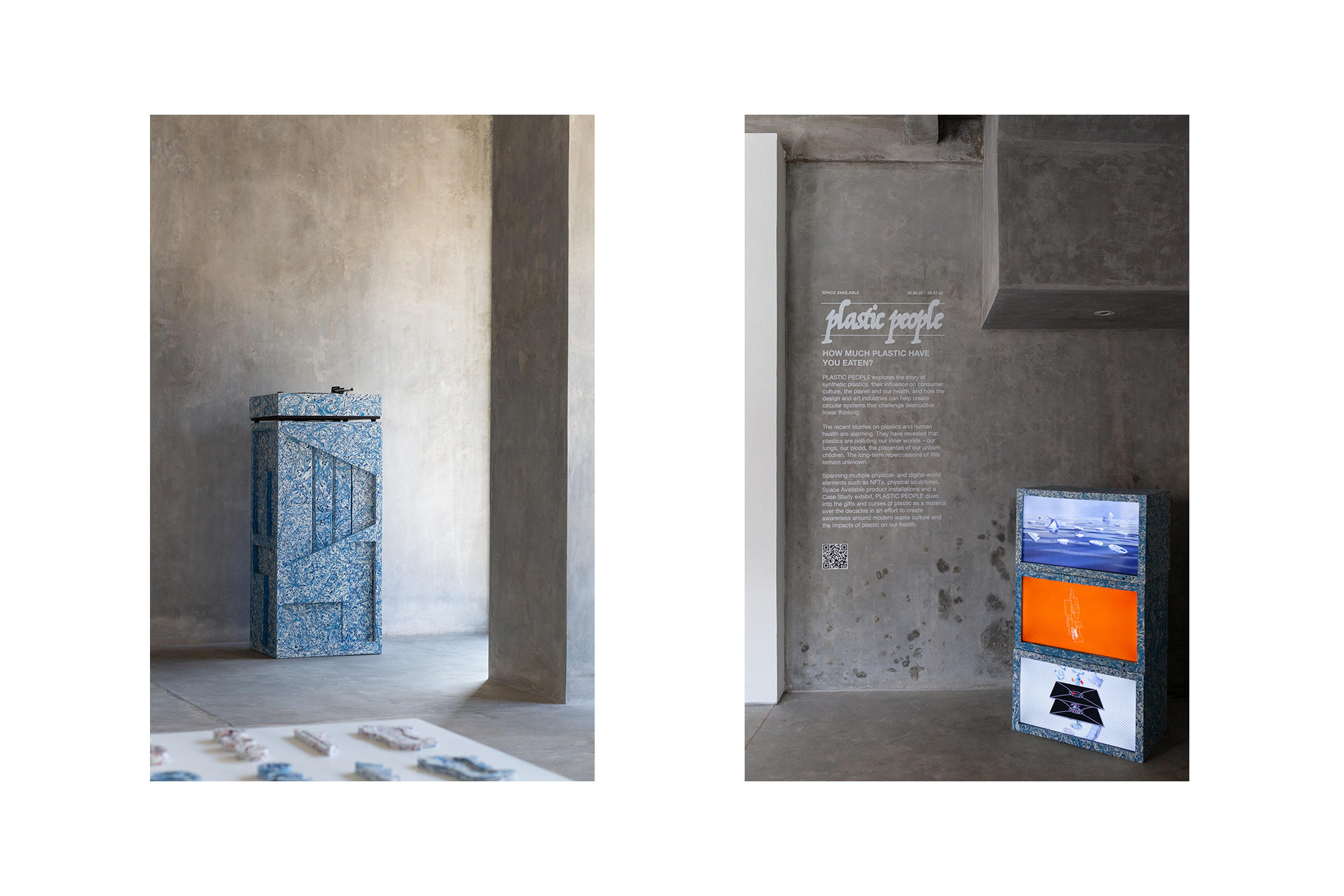
Do you think getting something like Space Available off the ground would have worked somewhere else? Or is that Bali magic…
The beauty of Bali is everything by default is made by hand because craft culture is still part of everyday life. Literally, somebody's crafted something out of a banana leaf everywhere you look there outside their front door. That's existed here for thousands of years and still exists today, which is pretty miraculous considering the invasion of tourism. You couldn't craft products like that in a place like London unless you had the money to spend fortunes on resources, but more than that, craft culture has died in the west on a mainstream level. People in Bali are also open to doing things differently if you guide them along, give them an idea, and get on with them. It's very relationship-oriented here; it's not just a business transaction.
We're also working with local artists and designers. Take Nano for example, who built the Meditation chair. When I first met him, nobody outside of Bali had heard of him because he's just one of many amazing artists here who just do what they do in everyday life locally. And it's not like we just paid him and got ourselves a great chair; he's part of the team now. We put his name on it, and he's gained a global following. We tell his story, and no one else in the world can weave like him. He's gone from having a team of two to a staff of ten that he's trained, and he is even starting his own school.
Making a difference locally and collaborating makes it all worthwhile and works well with the global sensibility I bring growing up in London. I could never do what Nano does, and he could never do what I do—and that's the cool thing about collaboration. I hope this inspires a new generation of weavers to celebrate their families' skill sets and traditions and inspires other trades to do the same.
How would you describe Bali’s creative and music community?
There are a lot of young creative kids here. What's been really interesting to see over the past few years is people referencing their own culture again. When I first moved here, it wasn't very common among the younger generation. It was more outward-facing. But now I've seen people rediscovering some of these weird and wonderful things that happen here and reinterpreting them in a new way because it's so rich in so many dimensions. Now we see a lot of young kids proud of their heritage. Look at Gabber Modus Operandi; they've taken Indonesian culture and messed it all up within their art.
Where would you like to see Space Available in five years?
We’re trying to build a Space Available ecosystem and that ecosystem is essentially everything that we feel we would need to live within a basic community: you need education, so we’re looking to build a school; you need culture, which means museums, artifacts, music and fashion; we need shelter, which includes architecture; and we need waste management and developing recycling centers. We’re even looking at survival and exploring the food sphere.
We’re doing all of this within the Space Available vision and just seeing where that takes us while building up a community. In tandem with doing more case studies, we plan to continue striving for a better future for people on this planet.
Visit MoSA in Bali at Jalan Pantai Batu Mejan No: 33a, Kabupaten Badung, Bali 80351, Indonesia from. Tuesday-Sunday from 11am-7pm. Or follow them on IG here.


